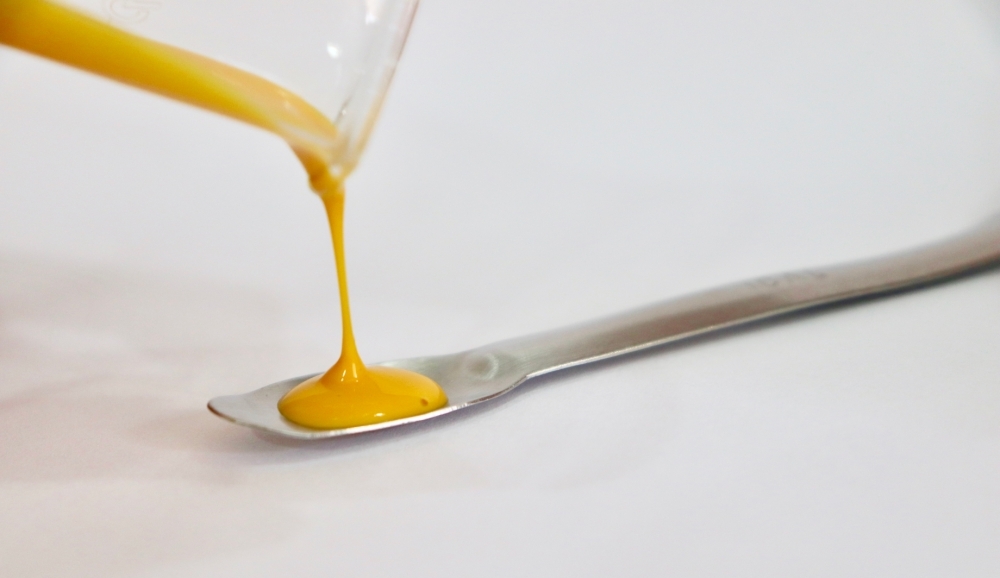


Researchers recombined extracts from this fruit industry waste to produce a mini-emulsion that can be used as the basis for an anti-aging skin complex (photo: Rubian)
Published on 10/11/2021
By Fábio de Castro | FAPESP Innovative R&D – Bagasse from passion fruit (Passiflora edulis), routinely thrown away by the juice industry, contains bioactive compounds whose properties have promising applications in the cosmetics market. This industrial waste is now a raw material for sustainably manufactured anti-aging skin products with tested and proven anti-oxidant action.
Supported by funding from the FAPESP Innovative Research in Small Business Program (PIPE), Rubian Extratos, a startup located in Sumaré, São Paulo state, Brazil, has developed a mini-emulsion of passion fruit bagasse as the basis for an anti-oxidant complex called Rejuvenate. The innovation has other possible applications.
According to chemical engineer Eduardo Aledo, one of the firm’s partners, the project included a series of tests to validate the product’s performance and safety.
“Passion fruit bagasse is a juice industry waste that’s typically thrown away, or at best used to make animal feed,” he says. “We set out to convert this waste into something with value that could be produced sustainably.”
The researchers recombined bagasse extracts to make the mini-emulsion (an emulsion with micrometric droplets) and tested it in the laboratory to identify markers of anti-oxidant action and inhibition of the enzymes that break down the skin’s collagen and elastin.
“Based on this, we were able to prove the metabolic routes for its action and the cellular mechanisms involved in these bioactives,” says food engineer Philipe dos Santos, also a partner in the firm.
Reducing blemishes and wrinkles
The researchers mapped the action of the bioactives present in the bagasse against skin blemishes, proving on that basis a specific route for Rejuvenate to inhibit the enzyme responsible for producing melanin. They also detected an increase in gene expression for markers relating to cell longevity.
“In addition, in February we performed a clinical trial involving 16 women to validate such properties as blemish reduction, a significant level of wrinkle reduction, and an increase in facial hydration,” Santos says.
According to Aledo, the firm was established in 2015 after the UNICAMP Challenge, a contest to foster the creation of business ventures based on technologies and patents held by the University of Campinas (UNICAMP).
“The firm was founded by undergraduates in the context of the UNICAMP Challenge, which aims to stimulate entrepreneurship. The university offers its patent portfolio for students to choose a technology and use it to develop a business model,” Aledo explains.
The firm first developed technology to produce an extract from the seeds of the annatto or achiote tree (Bixa orellana). The project was supported by PIPE-FAPESP. The next step was development of the product based on passion fruit bagasse.
“Our business model has four pillars: recognizing plant matrices and their functional bioactives; using clean and green processes; characterizing products and demonstrating that they are safe and effective; and sustainability,” Aledo says.
As a starting point for their innovations, the researchers focused on refining a clean process to extract compounds from passion fruit bagasse patented in 2011 by Julian Martínez and Juliane Viaganó, professors at UNICAMP.
“I was invited to work with the firm in 2017,” says Santos, who became a partner in 2021. “Starting from the patented process, we worked on the emulsification of these bioactives for use by the cosmetics industry. We submitted a proposal to PIPE-FAPESP in 2017 and were awarded funding.”
In Phase 1 of PIPE-FAPESP, the researchers validated a prototype to show that the extracts were bioactive and could be used as cosmetics. In Phase 2, they standardized the extracts and developed the mini-emulsions.
Using only clean techniques, bagasse retrieved from juice makers is processed, standardized, and submitted to two already patented extractive processes. A lipidic extract and an aqueous extract are obtained. “Both contain bioactives of interest. The former contains tocotrienols, carotenoids and fatty acids. The latter contains polyphenols,” Santos explains.
Next, the extracts are emulsified. “Basically we deconstruct the passion fruit bagasse and reconstruct it in emulsified form, according to the customer’s requirements,” he says.
As a residue, it is very hard to standardize, he adds. This was the focus for Phase 2, which aimed to take the end-product closer to the consumer. “In the standardization method we developed, we remove what we don’t want – stems, leaves, pieces of bark – and leave a little pulp and seed. We use an image-based algorithm to predict the quality of the material and whether it is fit for use in the extraction process,” Santos says.
The mini-emulsion was submitted to testing for cytotoxicity, genotoxicity, phototoxicity, and skin sensitization. As a prospective ingredient of cosmetic formulas, it also had to be tested at several different concentrations in prototype facial hydration and cleansing formulas, as well as formulas used by dispensing pharmacies.
“The mini-emulsion was validated for a wide array of applications,” Santos says. “It’s a minimalist, vegan, 100% natural product. Nothing synthetic in origin is used in the production process. Hence the large number of potential application routes.”
The tests also showed that the product contains piceatannol, a molecule of the same class as resveratrol, known as the “longevity molecule” and widely used in cosmetics and foods.
“This is an important result, because piceatannol is better than resveratrol, and the cosmetics industry is always looking for innovations,” Santos says.
The product may also have applications in the food industry, he adds. “The product itself is edible. It can be considered for both topical and oral supplementation. The market for skincare products has a model that’s directly associated with health and nutrition, so we also aim at the food industry as well as the cosmetics industry,” he says.
Source: https://agencia.fapesp.br/37049